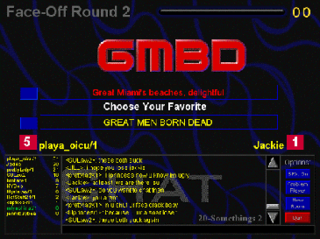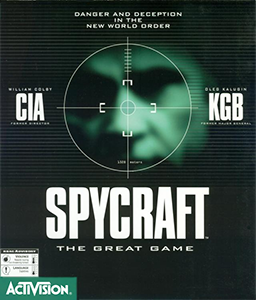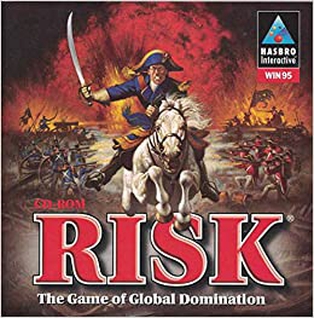
Starship Titanic is an adventure game developed by The Digital Village and published by Simon & Schuster Interactive. It was released in April 1998 for Microsoft Windows and in March 1999 for Apple Macintosh. The game takes place on the eponymous starship, which the player is tasked with repairing by locating the missing parts of its control system. The gameplay involves solving puzzles and speaking with the bots inside the ship. The game features a text parser similar to those of text adventure games with which the player can talk with characters.

Computer Gaming World (CGW) was an American computer game magazine published between 1981 and 2006. One of the few magazines of the era to survive the video game crash of 1983, it was sold to Ziff Davis in 1993. It expanded greatly through the 1990s and became one of the largest dedicated video game magazines, reaching around 500 pages by 1997.

Acrophobia is an online multiplayer word game. The game was originally conceived by Andrea Shubert, and programmed by Kenrick Mock and Michelle Hoyle in 1995. Originally available over Internet Relay Chat, the game has since been developed into a number of variants, as a download, playable through a browser, via Twitter or through Facebook.

Sid Meier's Gettysburg! is a 1997 real-time wargame developed by Firaxis Games and published by Electronic Arts. It was designed by Sid Meier, and followed by Sid Meier's Antietam! in 1999.

Rama is a first-person adventure game developed and published by Sierra On-Line in 1996. The game is based on Arthur C. Clarke's books Rendezvous with Rama (1973) and Rama II (1989) and supports both DOS and Microsoft Windows. In 1998, a PlayStation version was released in Japan. It is the second Rama game to be produced. The interactive fiction game Rendezvous with Rama was released in 1984 by Telarium.

Indiana Jones and His Desktop Adventures is a 1996 adventure video game. Desktop Adventures was made to run in a windowed form on the desktop to limit memory use and allow the player to perform other tasks. This game was the first Desktop Adventures game, and was followed by Star Wars: Yoda Stories in 1997.

Amber: Journeys Beyond is an American computer game released in 1996 for Apple Macintosh computers and Windows 95. It is the only game produced by Hue Forest Entertainment, founded by Frank and Susan Wimmer.

Obsidian is a 1997 graphic adventure game developed by Rocket Science Games and published by SegaSoft. It was released for Microsoft Windows and Mac OS.

Baku Baku, released in Japan as Baku Baku Animal, is a falling block puzzle arcade game released by Sega in 1995. The game is dedicated as Sega's first ever Network Compatible PC Game. A Sega NetLink compatible version of the game was also announced, but never released.

NASCAR Racing 2 is a video game developed by Papyrus Design Group and published by Sierra On-Line for Microsoft Windows and MS-DOS in late 1996.

Spycraft: The Great Game is an adventure CD-ROM game published by Activision in 1996. It details the attempted assassination of the President of the United States and the CIA and SVR attempts to save him. Although the game was not approved by either organization, it tends to favour realism due to its coordination with former CIA director William Colby and former KGB Major-General Oleg Kalugin, who also appear in the game as themselves. The game also stars James Karen, Dennis Lipscomb, Joseph Ruskin, Tim De Zarn, Kirk B.R. Woller, Allan Kolman, Chase Masterson and Charles Napier in prominent roles.

Longbow 2 is the sequel to the best-selling Jane's AH-64D Longbow from Jane's Combat Simulations, developed by Origin Systems with executive producer Andy Hollis on board, and released by Electronic Arts on November 13, 1997.

The Island of Dr. Brain is the second game in the Dr. Brain series by Sierra On-Line. It was released in 1992 and was only available for IBM PC compatibles. Like the first game in the Dr. Brain series, Castle of Dr. Brain, Island is an educational puzzle adventure game.

Jewels of the Oracle is a 1995 adventure game developed by ELOI Productions and published by Discis Knowledge Research Inc. It was released on Macintosh, PlayStation, Sega Saturn, and Windows. A sequel developed by Bardworks and published by Hoffman and Associates was released in 1998 entitled Jewels II: The Ultimate Challenge.

Thinkin' Things is a series of educational video games by the Edmark Corporation and released for Windows and Mac in the 1990s. Entries in the series include Thinkin' Things Collection 1 (Formerly Thinkin Things) (1993), Thinkin' Things Collection 2 (1994), Thinkin' Things Collection 3 (1995), the adventure game Thinkin' Things: Sky Island Mysteries (1998), Thinkin’ Things Galactic Brain Benders (1999), Thinkin' Things: All Around Frippletown (1999) and Thinkin' Things: Toony the Loon's Lagoon (1999).

Lose Your Marbles is a puzzle video game developed and published by SegaSoft and released for Microsoft Windows on August 19, 1997.

Byzantine: The Betrayal is a video game, released September 30, 1997 for Microsoft Windows.

Star Wars: Pit Droids is a puzzle game developed and published by Lucas Learning. It was originally released for Microsoft Windows and Macintosh on September 13, 1999. It was later ported to iOS and released on February 9, 2012. The game develops skills such as hypothesis testing and geometry.

Risk is a turn-based strategy video game based on the board game of the same name, released in 1996.

Wooden Ships and Iron Men is a 1996 computer wargame developed by Stanley Associates and published by Avalon Hill. It is an adaptation of the board wargame Wooden Ships and Iron Men.




















